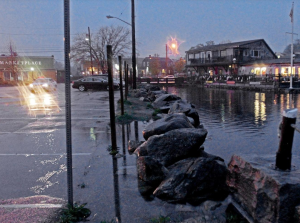Sea level rise predictions are . . . rising
Will rising water levels submerge your finances?
 New projections for global sea level published by the Arctic Monitoring and Assessment Program are much higher than previously thought. The AMAP report takes into account new knowledge about ice loss from Arctic glaciers and the ice sheet melt of Greenland. The result: a doubling of the minimum sea level rise estimates made by the Intergovernmental Panel on Climate Change only four years ago. The study predicts seas will rise on average worldwide at least 2.4 feet by the year 2100 under their extreme scenario.
New projections for global sea level published by the Arctic Monitoring and Assessment Program are much higher than previously thought. The AMAP report takes into account new knowledge about ice loss from Arctic glaciers and the ice sheet melt of Greenland. The result: a doubling of the minimum sea level rise estimates made by the Intergovernmental Panel on Climate Change only four years ago. The study predicts seas will rise on average worldwide at least 2.4 feet by the year 2100 under their extreme scenario.
It’s not their height numbers that catch the eye. After all, some local estimates are much higher. It’s that virtually every prediction is being revised upwards. The forecasters are playing catch-up with nature. And all of us could soon be playing catch up with our finances.
Just one of hundreds of examples: residents of Wickford, Rhode Island are becoming increasingly vulnerable to flooding in their low-lying village. Extreme high tides are rising to street-level and spilling up to a foot-and-a-half of water into a local parking lot. If the new predictions are true, all of the roads in and out of the village will be flooded, and an estimated 236 properties, with an assessed value of $133 million, will be affected by the end of the century. Wickford residents may have to fight the fish for the decent parking spots.
The town of North Kingstown, where the small village of Wickford lies, was chosen as the pilot community for a project led by the Coastal Resources Center and Rhode Island Sea Grant to assess and plan for climate change risks in the state. Climate scientists and coastal planners are studying these periodic floods as they plan ways to guide future development and protect roads and other critical infrastructure.
Will these new sea level predictions add strain to your finances by reducing your property value or raising local taxes? The Where-to-Live Scorecards compiled by Climate-Proof show data on each town’s potential to protect residents from these predicted climate change challenges. If relocating seems inevitable, the Scorecards can help you evaluate a specific town you may want to consider.



